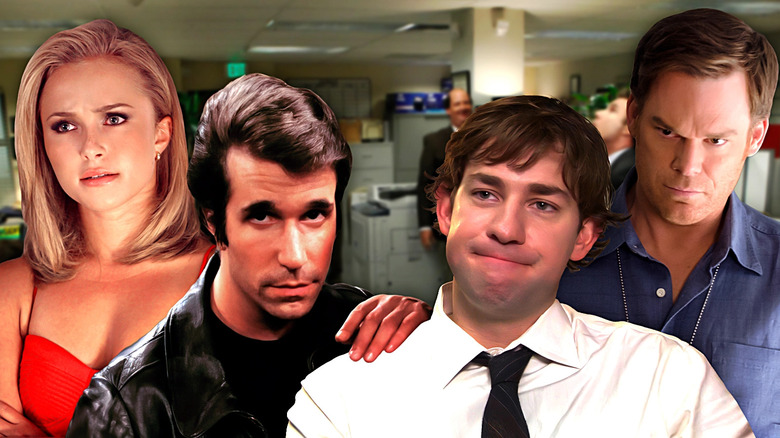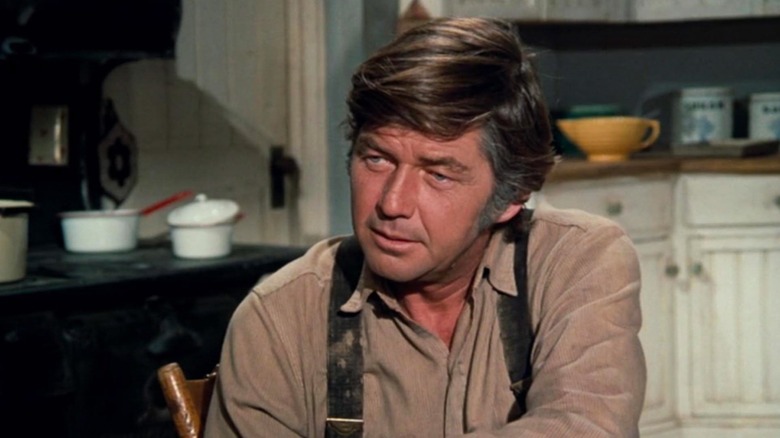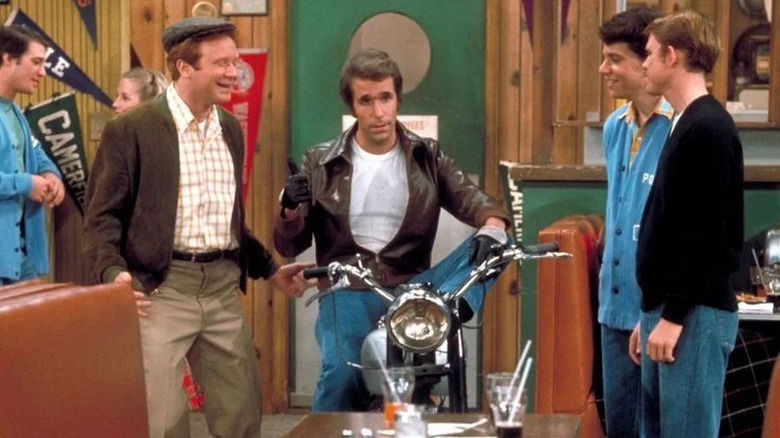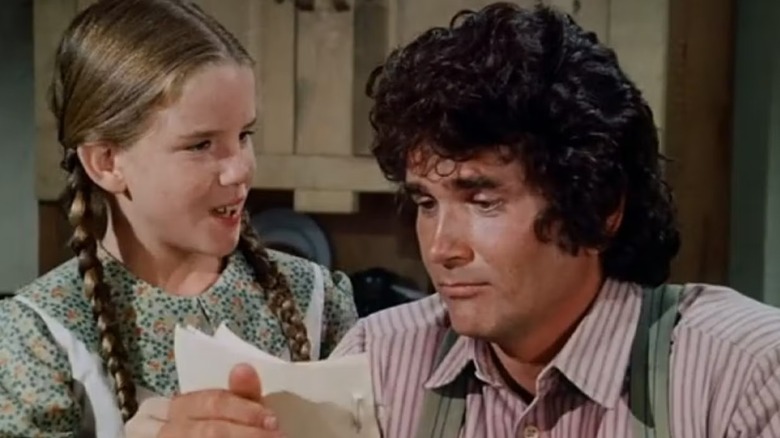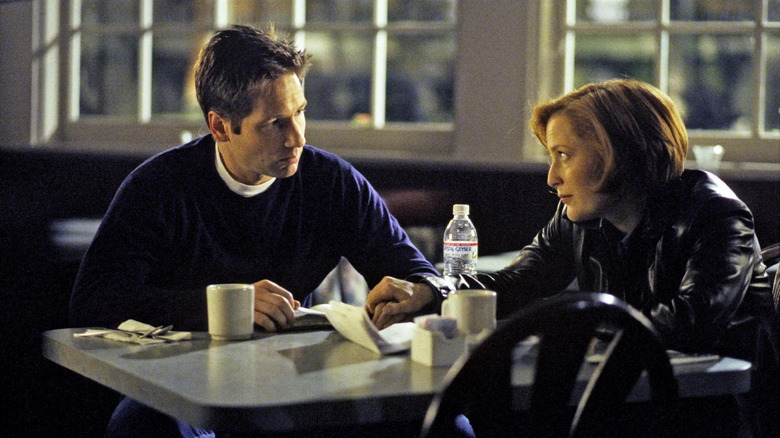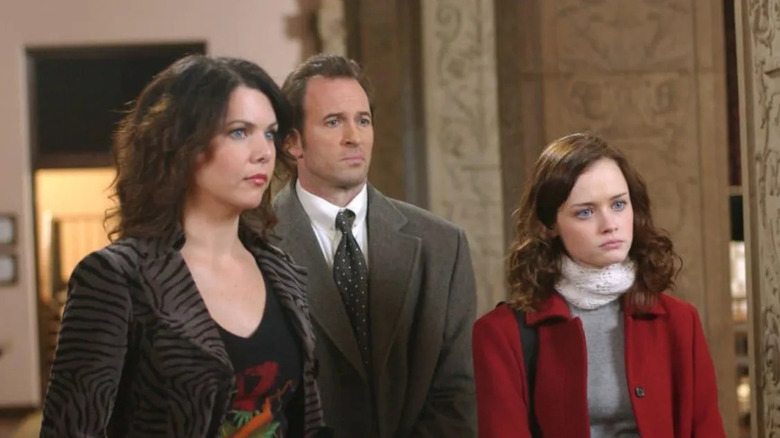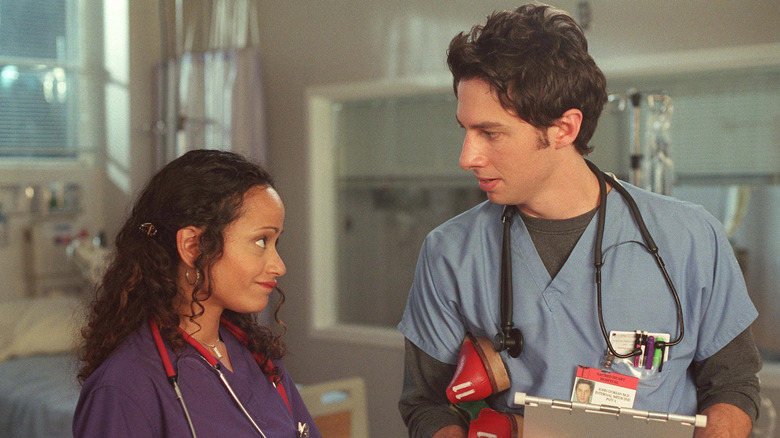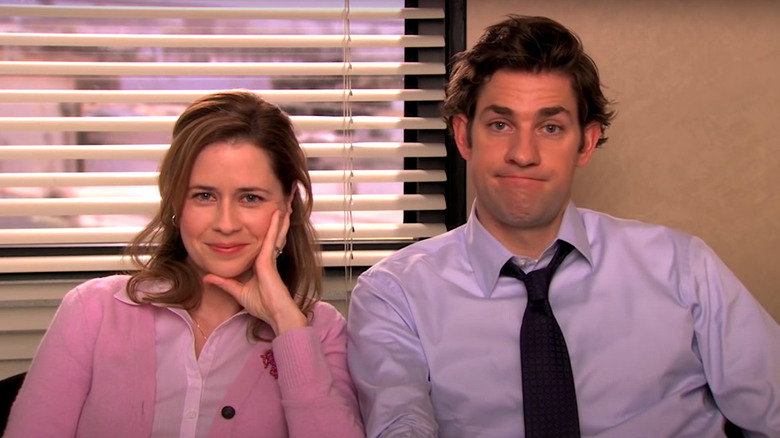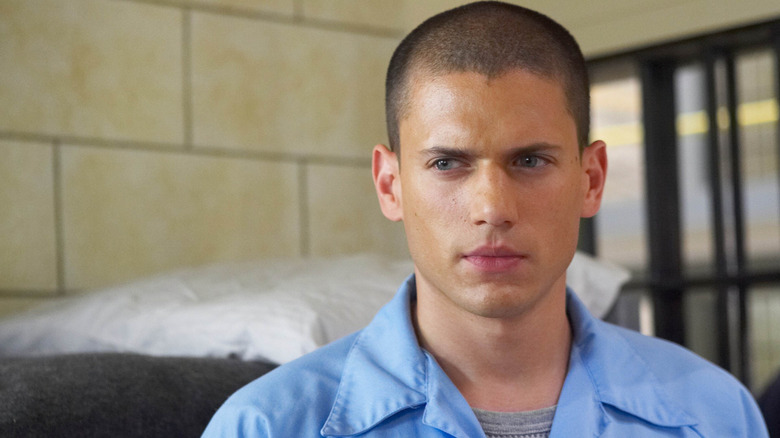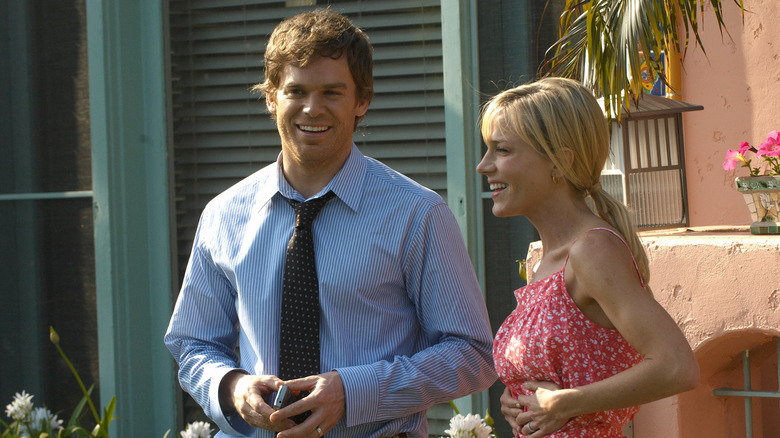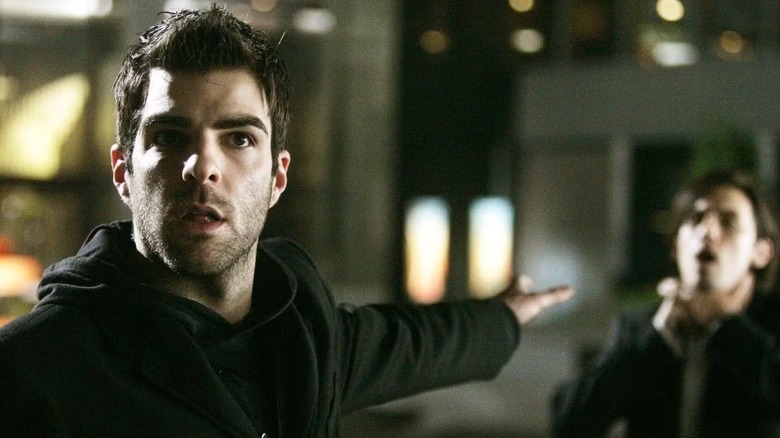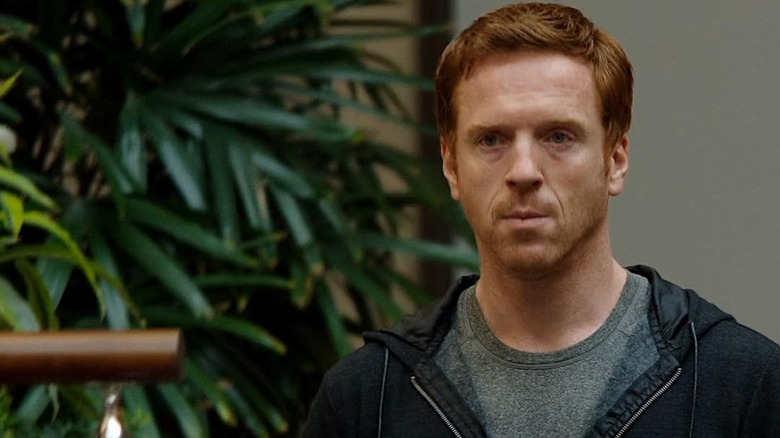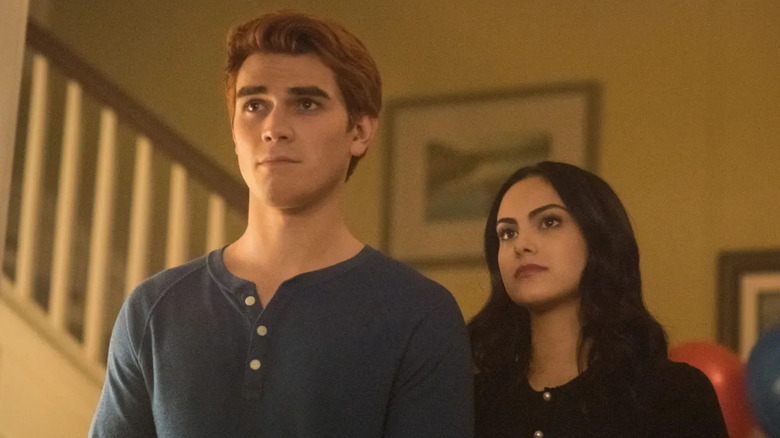12 Hit TV Shows That Should Have Ended Sooner Than They Did
Sometimes even the best television shows are victims of their own success, running longer than their natural story should at the expense of their overall quality. From will-they/won't-they romances fulfilled too quickly or the show trying to prolong its central conflicts and mysteries, popular shows try to artificially draw out their narratives to maintain audiences. This leaves even the most ardent fans of a given show acknowledging that there are lesser seasons missing the magic that made the series so successful. A perfect show knows when to call it quits before it overstays its welcome, but very few of them can take that hint.
Simply put, even many beloved shows just try to milk the last bit of success they can, even after enduring changes to their overarching plot or main cast. In doing so, the legacy of these prolonged series is a bit tarnished from their previous esteemed status. Here are 12 hit TV shows that should have ended sooner than they did.
The Waltons
As far as wholesome '70s television programming goes, few shows are more ubiquitous than "The Waltons," which ran for nine seasons from 1972 to 1981. Series creator Earl Hamner Jr. based the show on his own upbringing in rural Virginia during the Great Depression in the '30s. John-Boy Walton, initially played by Richard Thomas, grows up with his six siblings, along with his parents and grandparents. As the family endures the economic depression, the advent of World War II deeply impacts them and their community, with all the Walton boys enlisting in the military.
After seven seasons, Thomas left "The Waltons," with the role of John-Boy recast with Robert Wightman. With John-Boy such a central character to "The Waltons" and its ensemble cast's easygoing chemistry, the show never quite recovered from losing its original lead actor. "The Waltons" would run for two more seasons and a number of TV movies, but the magic was noticeably gone.
In its tale of family triumphing over all, the lack of the actor behind the Waltons' most prominent family member led to the show's gradual implosion.
Happy Days
The popular sitcom "Happy Days" was a television staple for a full decade, airing for 11 seasons from 1974 to 1984. Set in the suburbs of Milwaukee in the '50s and early '60s, the show revolved around the Cunningham family, particularly the teenage Richie (Ron Howard). The coolest dude in the neighborhood is Arthur "Fonzie" Fonzarelli (Henry Winkler), a greaser with a heart of gold. While Winkler's performance as Fonzie made him and his character household icons, "Happy Days" went on to inspire five spin-off series across its lengthy run.
As he began to find more work as a director, Howard decided to gradually stop acting, leading to Richie being written out of "Happy Days" following its seventh season. Without its original protagonist, "Happy Days" turned its attention to Fonzie more than ever, including its new central young couple Joanie Cunningham (Erin Moran) and Chachi Arcola (Scott Baio). These final four seasons without Howard feel like the show is struggling to redefine itself, especially as the story progresses into the '60s. Though Winkler still brings the smooth charm, the Fonz's lack of rapport with Richie makes the schtick less effective.
Little House on the Prairie
Author Laura Ingalls Wilder's children's book series "Little House on the Prairie" was adapted into a Western series of the same name in 1974. Running for nine seasons until 1983, the show focused on the Ingalls family living on a Minnesota farm in the late 19th century. The family is headed by Charles (Michael Landon) and Caroline (Karen Grassle), raising their children together as their rural community develops. After the eighth season, both Landon and Grassle left as series regulars, with the show retitled for its final season as "Little House: A New Beginning."
"Little House on the Prairie" was far from the only Western to run for an extended period of time, but the show felt like it overstayed its welcome more than its contemporaries. The difference is that shows like "Gunsmoke" and "Bonanza" kept their lead actors for the entirety of their respective series. The absence of Landon and Grassle is acutely felt in the final season of "Little House," particularly given the breadth of Landon's creative input behind the scenes. This, coupled with "Little House" being a coming-of-age story that already saw its lead children grow up, made the series falter in its final season.
The X-Files
The sci-fi thriller series "The X-Files" helped establish Fox as a major television network and just oozed a style and ambiance that reflected early '90s television. The show followed FBI agents Fox Mulder (David Duchovny) and Dana Scully (Gillian Anderson) as they investigated paranormal occurrences nationwide. This leads them to discover a government conspiracy to conceal the existence of extraterrestrials from the public. The original run of "The X-Files" lasted nine seasons, receiving two feature films and a two-season revival to continue its story.
In the middle of its run, the movie "The X-Files: Fight the Future" was released, serving as the culmination of the first five seasons of its overarching narrative. Though the series resumed as normal, the same sense of stakes and urgency weren't quite as present in subsequent seasons. Behind the scenes, Duchovny — and later Anderson –gradually phased out their participation on the show, replaced by new protagonists John Doggett (Robert Patrick) and Monica Reyes (Annabeth Gish). Though the later seasons of "The X-Files" had solid episodes, the same allure and appeal from its initial seasons dissipated following its halfway point.
Gilmore Girls
"Gilmore Girls" is a wholesome coming-of-age story crafted by Amy Sherman-Palladino, running for seven seasons from 2000 to 2007. Set in the fictional New England town of Stars Hollow, single mother Lorelai Gilmore (Lauren Graham) raises her teenage daughter Rory (Alexis Bledel) while running the town's inn. As Rory progresses through high school and college, she and her mother endure the ups and downs of love and life in their own ways. In 2016, the show revived a limited series revival, "Gilmore Girls: A Year in the Life," concluding with Rory becoming a mother herself.
Sherman-Palladino left "Gilmore Girls" after its sixth season, and was replaced by David S. Rosenthal as the showrunner for the final season. The change in quality is noticeable, with the characters often veering into outright melodrama and their usual rapid-fire repartee not quite as punchy. Most egregiously, season 7 has Lorelai marry her high school boyfriend Christopher (David Sutcliffe) in the spur of the moment, leaving her fan-favorite love interest Luke (Scott Patterson). "A Year in the Life" would avoid many of the seventh season's developments, something fans have similarly done in their own reflections on the series.
Scrubs
Long before co-developing "Ted Lasso," prolific television writer and producer Bill Lawrence created the medical sitcom "Scrubs." Running for nine seasons from 2001 to 2010, "Scrubs" had recent med school graduates J.D. Dorian (Zach Braff) and Christopher Turk (Donald Faison) begin working together at a California hospital. Both doctors find love among their colleagues while J.D. looks up to the hospital's attending physician Perry Cox (John C. McGinley), to the latter's annoyance. These bonds grow and deepen as the medical staff constantly deals with having their patients' lives in their capable hands.
Lawrence had intended to conclude "Scrubs" with its eighth season, going as far as to title its last episode "My Finale." However, the show's new network home, ABC, who had picked up the series from NBC for its eighth season, decided to continue "Scrubs" for a ninth season. The final season shifted its focus to a new generation of aspiring physicians attending med school, with Turk and Cox as instructors. This change in direction and protagonists, along with heightened network scrutiny under ABC, brought "Scrubs" to an unsatisfying end.
The Office (2005)
After the incredible success of the original British version of "The Office," an American version of the workplace comedy premiered in 2005. While the American "Office" found its own identity, the broad strokes remained, with a boorish boss (Steve Carell), and the will-they/won't-they couple played by John Krasinski and Jenna Fischer. Krasinski and Fischer's characters, Jim and Pam, finally became a couple going into season 4, while Carell's character, Michael Scott, left during the seventh season. "The Office" ran for two additional seasons for a total of nine seasons overall, concluding in 2013.
Comparatively, the British "Office" initially ran for only two seasons and a Christmas special, knowing when to neatly put a narrative bow on its story. While some may argue the American "Office" should've wrapped after Jim and Pam's coupling, even the most diehard fans would agree the show significantly dipped in quality after Carell's departure. The series struggled to find a clear direction without its original boss, including a temporary stint with James Spader in the penultimate season. Spinning its wheels for its final two seasons, "The Office" never quite creatively gelled without Carell's Michael Scott at the helm.
Prison Break
The crime thriller series "Prison Break" started with an effectively focused premise –- protagonist Michael Scofield (Wentworth Miller) decides to rescue his brother from prison after he's framed for murder. This involves Michael deliberately being caught during a heist to reunite with his brother Lincoln (Dominic Purcell) behind bars to allow them to plan their prison escape together. After that escape, the second season has the brothers and their accomplices on the run before Michael is imprisoned in a Panamanian prison when they flee overseas. The third season inverts the first season's dynamic, with Lincoln now working to free Michael from imprisonment.
These three seasons of "Prison Break" are great, finding fun and organic directions to play with its premise. It's the fourth season — as the series shifts to globe-trotting espionage action — when the show starts to go off the rails. This unfortunately carries over to the 2017 revival season which, while bringing back much of the familiar "Prison Break" cast, just doesn't retain the show's original charm. Call us old-fashioned, but a series called "Prison Break" should probably have a continued emphasis on its characters breaking out of prisons.
Dexter
Based on the novel series "Darkly Dreaming Dexter" by Jeff Lindsay, the Showtime series "Dexter" ran for eight seasons from 2006 to 2013. The show follows Dexter Morgan (Michael C. Hall), a serial killer who focuses his lethal activities on other murderers escaping justice in the Miami area. Dexter works as a forensic specialist for the Miami Police, concealing his true nature from his colleagues. Following the show's conclusion, "Dexter" spawned a continuation limited series, "Dexter: New Blood," and a prequel, "Dexter: Original Sin."
After the fourth season and the conclusion of Dexter's showdown with the calculating Trinity Killer, played masterfully by John Lithgow, the show's original showrunner Clyde Phillips left the series. While Hall continued to bring his usual dark intensity as Dexter, the series never quite felt the same or reached similar creative heights as it had under Phillips. Diminishing in quality for years, the horrible "Dexter" series finale nearly upended the show's legacy and goodwill among fans. "Dexter" should've had its eye on an endgame following Phillips' departure as showrunner instead of limping across the finish line.
Heroes
Coming out just before the rise of the Marvel Cinematic Universe, 2006's "Heroes" offered a postmodern take on the superhero genre before it went mainstream. The series had ordinary people around the world developing unique superpowers, with a shadowy organization known simply as The Company, trying to track them down and control them. This escalates into a small group of heroes working to avert an impending apocalypse glimpsed by a precognitive member of their makeshift team. "Heroes" ran for four seasons, from 2006 to 2009, receiving a short-lived revival, titled "Heroes Reborn," in 2015.
While the first season of "Heroes" was well-received, fans were increasingly divided on the following. The lack of charismatic villains, like the first season's Sylar (Zachary Quinto), and meandering plots failed to retain audiences moving forward. Even "Heroes Reborn" failed to reignite the show in a meaningful way, with Quinto's absence as Sylar acutely felt. Ultimately, "Heroes" is an example that one well-constructed debut season doesn't ensure prolonged quality in storytelling if there isn't an overarching solid vision.
Homeland
The Showtime original political thriller "Homeland" revolved around a chilling central premise for its first three seasons. American war hero Nicholas Brody (Damian Lewis) was turned into a sleeper agent while under captivity by al-Qaeda. As Brody rapidly ascends through a political career in the federal government, CIA operative Carrie Mathison (Claire Danes) suspects something is off about him. Later seasons involve Mathison facing other threats to the United States, both domestic and foreign, in the wake of Brody's true nature being exposed.
So much of the early appeal to "Homeland" was the elaborate cat-and-mouse game between Mathison and Brody, with the stakes steadily increasing every episode. However, by the third season, the Brody storyline had worn thin, with every attempt to prolong it growing more ludicrous. Though the show benefited overall from resolving the Brody story, it never recaptured the thrill of its first two seasons. Danes and co-star Mandy Patinkin always brought their A-game, but the arcs their characters were given lacked the consistent focus they deserved.
Riverdale
The Archie Comics characters have been a comic book staple since the '40s, depicting a timeless portrait of small-town Americana. The CW series "Riverdale" subverted this by turning its titular town into a swirling cesspool of suburban angst, long-standing feuds, and a healthy dose of murder. Unassuming boy-next-door Archie Andrews (KJ Apa) and his friends investigate the grisly death of a classmate, uncovering Riverdale's dark secrets and old conflicts along the way. "Riverdale" ran for seven seasons, from 2017 to 2023, spawning the spin-off series "Chilling Adventures of Sabrina" and "Katy Keene."
"Riverdale" started out as a relatively grounded show, with its first two seasons revolving around murder mysteries and small-town intrigue. By the third season, the series began incorporating occult conspiracies, with later seasons including alternate universes and overtly supernatural stakes. As the series progressed, it almost became a running contest to see how outlandish and absurd "Riverdale" could get, with its cast usually playing these antics with deadpan seriousness. There was still a charm in later seasons, but the early seasons of "Riverdale," when the plots were simpler, stand as a creative high it lost sight of.
